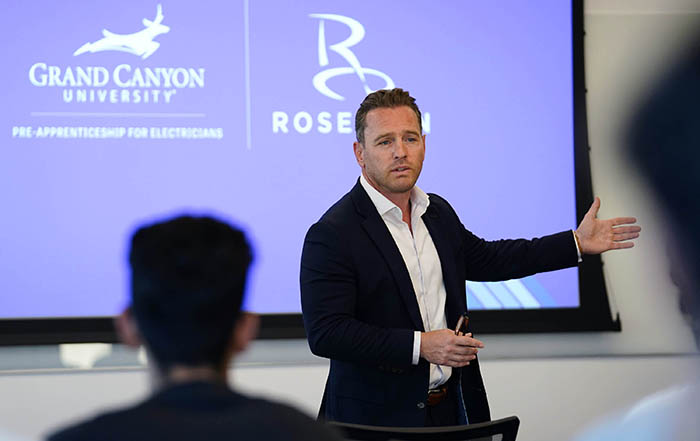
Story by Rick Vacek
Photos by Ralph Freso
GCU News Bureau
Traditional universities typically don’t teach the trades. They don’t have instruction about construction.
So when Grand Canyon University was represented in late April at the Construction Science Technology Apprenticeship Fair at Chase Field in downtown Phoenix, it turned the heads of attendees.
“When I say they were beyond blown away, it’s an understatement,” said Dr. Joe Veres, GCU’s Vice President for Student Success.
Veres frequently heard something like this:
“I can’t believe GCU is doing this. Finally, a university is stepping alongside the trades and finding a clear path for them that will support them.”
The path was paved when the Maricopa County Board of Supervisors approved a $669,471 grant that, with additional funding from Rosendin Electric, enabling GCU to launch a four-course, 16-credit Pre-Apprenticeship for Electricians through the University's Institute for Workforce Development.
Those interested can visit https://www.gcu.edu/degree-programs/electrician-pre-apprenticeship for more information.
It will be free to about 80 students in the first year, with GCU aiming to sign up at least 40 people for the September opening and another 40 or more in the spring semester.
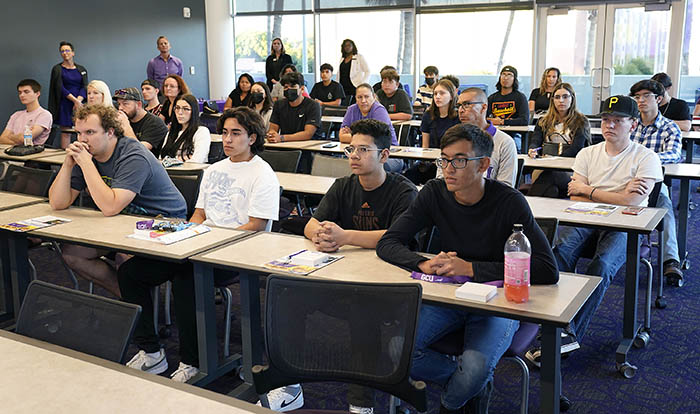
The four courses, designed to be completed in one semester:
- Student Orientation and Electrician Industry Skills
- English for Professional Written and Verbal Communication
- Math Applications
- Electrical Foundations
Attendees will be considered GCU students. If they need help in their studies, they can utilize the Academic and Career Excellence (ACE) Centers. If they would like to attend Chapel or an athletic event or a club activity, they can do that. If they’d like to work on campus, there could be opportunities there, too.
“They’ll have access to all of our resources,” Veres said.
They also will have access to Rosendin, the largest employee-owned electrical contractor in the U.S. The company has more than 7,500 employees working in 19 offices nationwide.
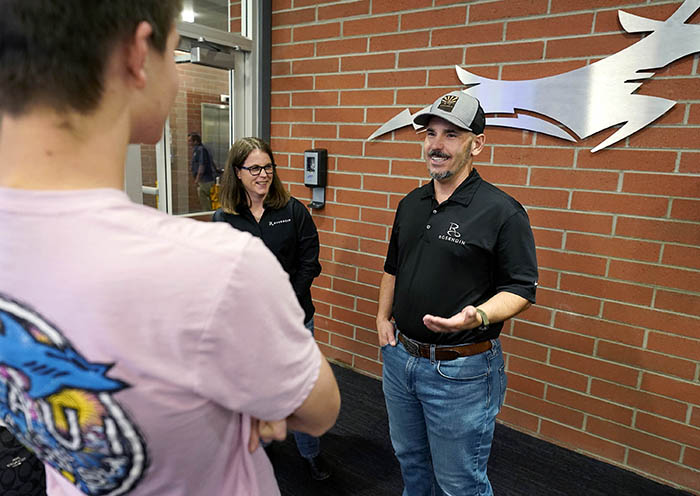
The students can work for Rosendin while taking the classes, which will count toward the 1,000 hours (approximately six months) of on-the-job training required to qualify for a 5% raise. Rosendin guarantees another 5% raise after an employee’s second 1,000-hour stint, and those raises are 5% of the journeyman wage of $32 per hour, not the beginning salary.
“I can’t think of any industry that guarantees a 10% raise in that short of an amount of time,” Rosendin Outreach Director Aimee Olmedo said.
Once they complete the Pre-Apprenticeship courses at GCU, they are eligible for entry into Rosendin’s apprenticeship program and its on-the-job training in the field.
Stephan Cole, Rosendin’s Workforce Development Trainer, estimates that candidates can make $150,000 to $160,000 during the apprenticeship program while paying approximately $10,000 for books and other fees.
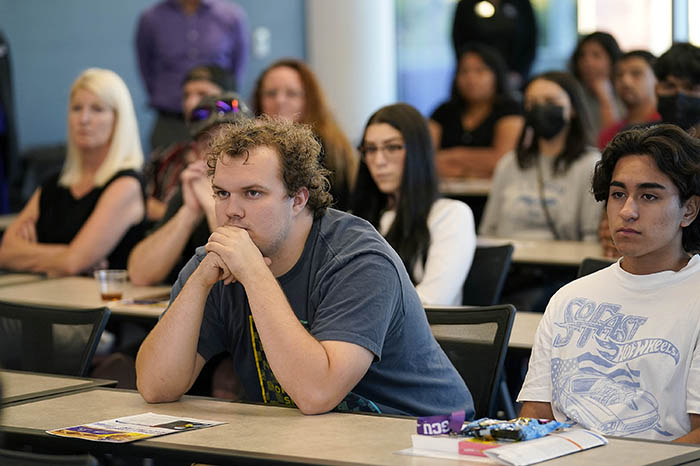
Just as GCU has taken major steps to try to alleviate workforce shortages for teachers, nurses and social workers, it is launching this initiative to help fill the need for electricians.
Rosendin CEO Mike Greenawalt estimates that Arizona needs another 1,500 professionals able to handle electricity, and the U.S. Bureau of Labor Statistics projects 9% job growth in the field between 2020 and 2030.
“This pathway is a great example of industry, a university and Maricopa County working together to solve a workforce problem,” GCU President Brian Mueller said.
It also has become a respect problem. Emily Belt, GCU’s Director of Regional Operations, Traditional Campus, noted that a career in the trades has come to be viewed as less valuable than a college degree. GCU's Institute for Workforce Development helps close that gap.
“We’re not just addressing the shortage of electricians,” she said. “We’ve identified, with our investment in education and our understanding and championing of degrees, that in this country that has translated into a perceived lack of need and almost a disrespect for the skills of the trades. We, Grand Canyon University, understand that that’s completely inaccurate.
“So GCU, always being about the community and about the people, has decided we’re not going to have that position. Why can’t we be part of restoring some of the respect and honor to these skilled trades that are necessary for our country and our growth and our development?”
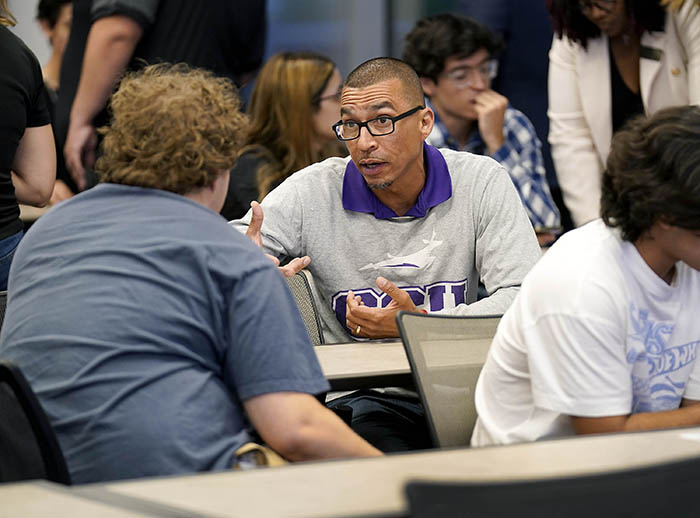
The lack of respect is partly the result of a lack of understanding. Like just about every other industry, construction has embraced technology. Laptops are a crucial tool at every job site, but Olmedo still fields questions that reflect a bygone era and a false perception.
“They think it’s like digging a ditch or standing with a stop sign,” she said.
Instead, Rosendin did the electrical work for projects such as the Maricopa County Downtown Court Tower, Mesa Data Center and Sheraton Phoenix Downtown. That’s complicated. And the need for that kind of expertise is particularly acute in Arizona, which continues to attract more technology-oriented companies.
Olmedo’s table at career fairs is like a show-and-tell – she provides information but also shows interested attendees how to wire an outlet.
“Some of them are like, ‘Oh, I don’t think I could do that,’ and I’m like, ‘Yeah, you can. Come here. Let’s do this,’” she said. “Then they’re impressed with themselves.”
Her colleague Cole stressed that the apprenticeship training is as thorough as the company’s many benefits. For example, employees don’t pay a penny for medical insurance or their pension. It’s all paid by Rosendin or the contractor.
But newcomers to Rosendin also learn something else about it that’s equally important.
“As we’re hiring people, we’re sharing the culture of our company,” Cole said. “We’re sharing our core values, our mission statements – not just words on the screen, but showing how we actually act according to those things with some of the programs that we have internally.”
Veres has been duly impressed in working with Greenawalt, Olmedo, Cole and others at Rosendin.
“They’re just an incredible company,” he said.
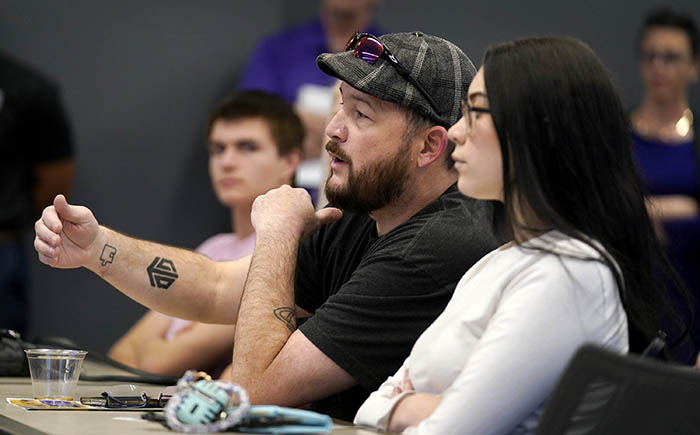
Many of the young people who attended an informational session at GCU in early May were impressed enough to sign up for the Pre-Apprenticeship pathway. One of them was Addy Rose, a senior at Liberty High School in Peoria, Arizona.
“I’m always open to trying new things. I like to solve puzzles, and it just seemed really interesting to me, the way minds work,” said Rose, who also is considering a career in forensic psychology.
She learned about it from her father, Jason Rose, an information technology administrator at GCU who got interested when it was mentioned in a leadership meeting and thought it would be perfect for his daughter.
“She’s smart. She thinks things out,” he said. “And she’s a rule follower, which is big when you need that.”
Such as when you’re handling electricity.
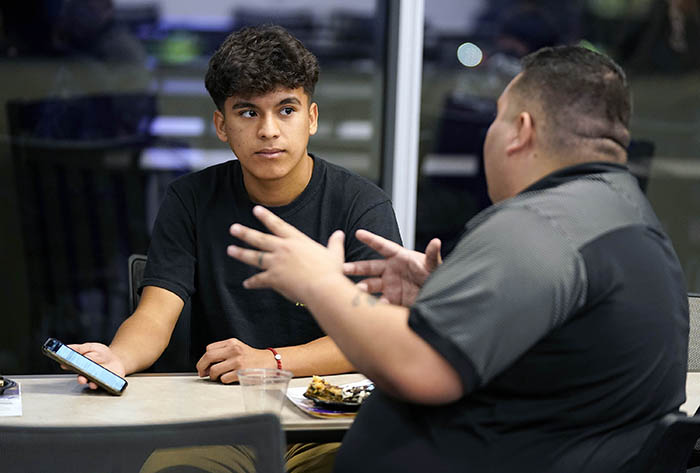
Carlos Chavez, a senior at Apollo High School in Glendale, Arizona, said he doesn’t plan to go to college, but going to GCU briefly for the Pre-Apprenticeship courses interested him when he heard about it from his algebra teacher.
“It’s a path that can take me far,” he said.
Chavez had thought of trying to become a computer mechanic, but electrician sounds more appealing. “To me it’s more professional,” he said.
So the push is on to fill those spots for the fall semester. Veres is confident they will go fast, just as he is sure about what GCU will accomplish with this initiative.
“You have a university that is supporting industry to make sure that you are fully competent during that apprenticeship, not just to complete it but to excel,” he told people during the Chase Field fair. “We want these 40 students to be the best 40 students that have ever been an apprentice in the country because that builds interest.”
And attacks another labor shortage.
Contact Rick Vacek at (602) 639-8203 or [email protected].
****
Related content:
Press release: Grand Canyon University helps fill electrician shortage
GCU Today: GCU helps stem teaching, nursing shortages
GCU Today: GCU grads fill a primary school's teacher shortage



































































